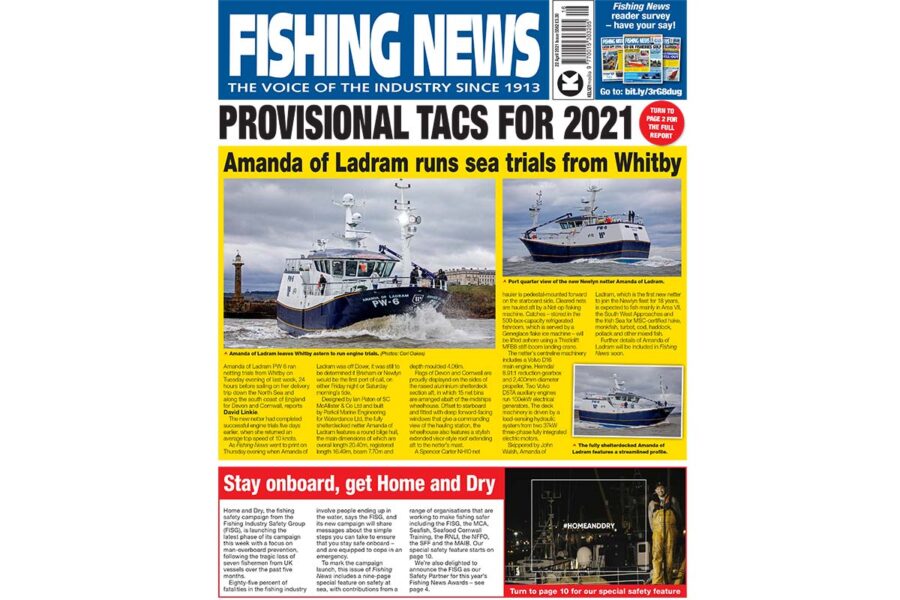‘Industry needs certainty’ says DEFRA
The government has set provisional TACs for UK-EU shared stocks for the remainder of 2021, or until an agreement is reached with the EU, reports Tim Oliver.
Provisional TACs had been set up to 14 April, and the new 2021 TACs supersede these catch limits. DEFRA said then that if agreement on fishing opportunities with the EU had not been reached by 14 April, it would extend provisional TACs for the rest of 2021. The EU recently extended its provisional catch limits until 31 July.
DEFRA said: “The UK remains committed to working closely with the EU on the sustainable management of shared stocks and to seeking an agreement on outstanding fisheries issues for 2021. If catch limits are agreed with the EU, then these will be updated accordingly.
“The provisional catch limits for UK vessels set today are consistent with the approach and new quota shares outlined in the UK-EU Trade and Co-operation Agreement (TCA). While differences remain between the two parties, these catch limits reflect progress in negotiations up to this point.”
On quota exchanges, DEFRA said the UK remains open to exchanges with the EU for 2021 and ‘both parties will continue to explore the benefits of these swaps for their fishing industries’.
The government has also set out how additional fishing quota gained since leaving the EU will be allocated to the English fleet (see below).
Industry leaders were briefed on the provisional TACs and the progress of the talks last Wednesday evening (14 April).
NFFO chief executive Barrie Deas said officials stressed that talks are continuing, and there are still hopes that agreement can be reached.
He said it was explained that the TACs have to have the term ‘provisional’ attached until they are formally agreed. The provisional TACs have been set for the rest of 2021 because the government wants to give certainty to the industry.
“What was stressed repeatedly was that the talks continue, including on the TACs, so on the UK side they are still hoping to get an agreement – that was the main thrust of the briefing,” he told Fishing News.
Industry leaders were told that there may be adjustments to the numbers, but ‘we were assured the degree of change to the numbers will be very small, and probably only in an upward direction’.
All the other elements of the talks, such as non-quota species, sea bass and Celtic Sea technical measures, are ongoing. But it was unknown how long the talks will go on, or how they will end – with agreement, a partial agreement or no agreement.
It will not be possible to arrange any quota swaps until the TACs are finally agreed, and the industry was told the UK is open to exchanges that benefit both sides. “It will be interesting to see the EU reaction to that, whether it will lead to a redoubling of efforts to reach agreement or something other than that,” said Barrie Deas.
He pointed out that we are well past the first quarter of the year, and that the ICES advice for 2022 fishing opportunities will be published in June.
He said it was not really known what the sticking points are in the negotiations, but they were probably non-TAC species, sea bass and some of the TAC species – and there was thought to be ‘some distance’ between the two sides on all these issues.
“Talks on bass are continuing. The UK wants more flexibility in the regime to reduce dead discards, but my impression is that the EU is resisting that and saying ‘it’s the EU way only’ – but again, we don’t have a huge amount of detail.”
The TAC table published by DEFRA is a highly technical document, and DEFRA has agreed to publish a simplified version that will show comparisons with last year’s TACs and quotas so that the industry knows whether it will be better or worse off. “We presume the additional quota we have received under the TCA is in there,” said Barrie Deas.
He said that while officials were at pains to stress that the talks will continue, there may be a point at which they draw a line, despite some issues needing more discussion.
“I get the impression under the new regime that the talks never end as such. You can have an annual agreement with an agreed record, and issues that are unresolved within that get moved to the specialised committees that are being set up – but we don’t know much yet about how they will operate.”
It was also stressed that both sides have regulatory autonomy, so if there is no agreement ‘we can do things on our own – but we’re not there yet’.
Talks are also continuing with Norway, but again there was little detail on progress. The main issues there are likely to be access to each other’s waters and quota swaps.
For more up-to-date, in-depth news on the UK and Irish fishing industry, subscribe to Fishing News here.








